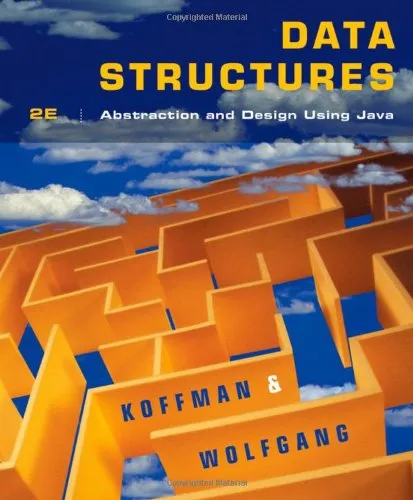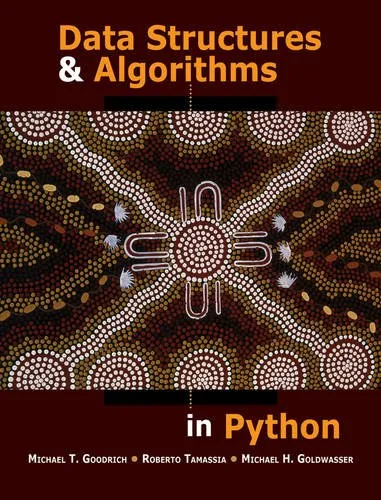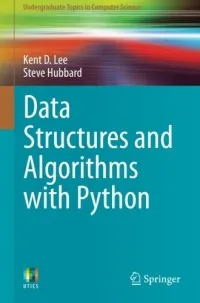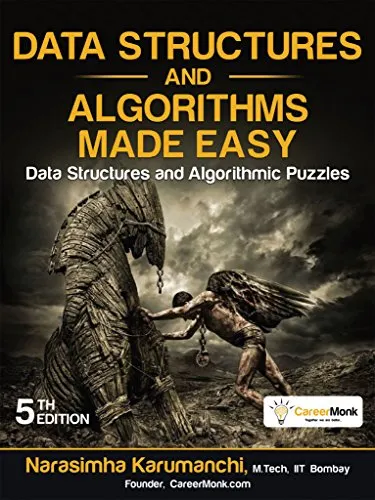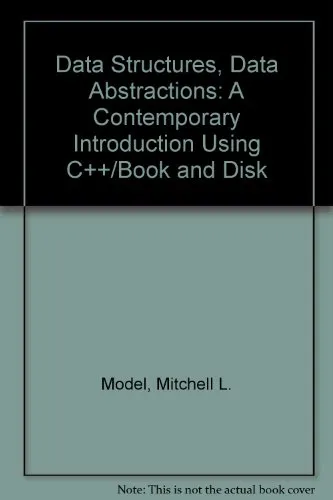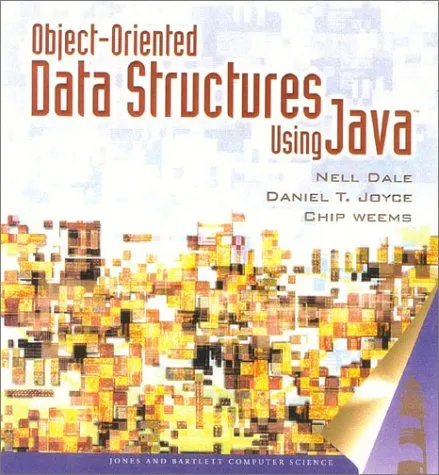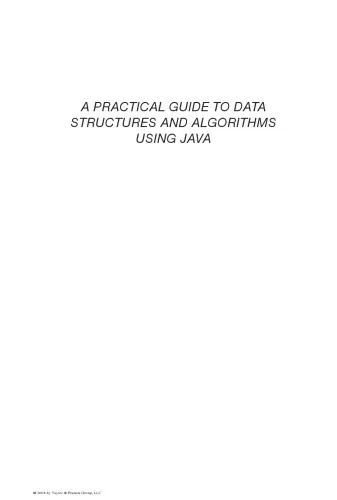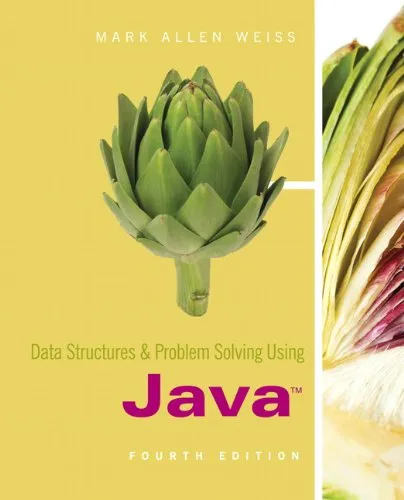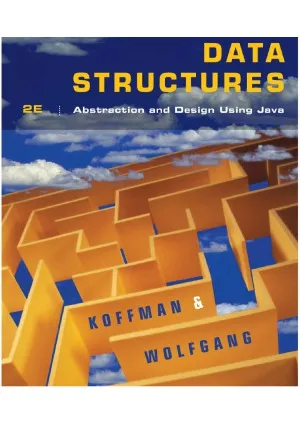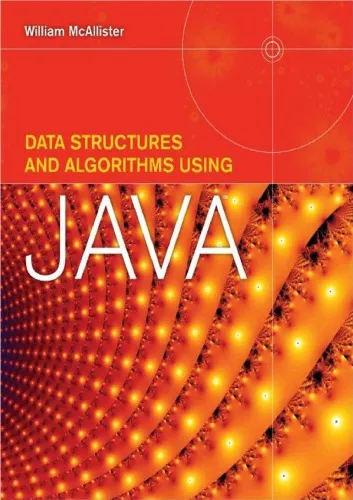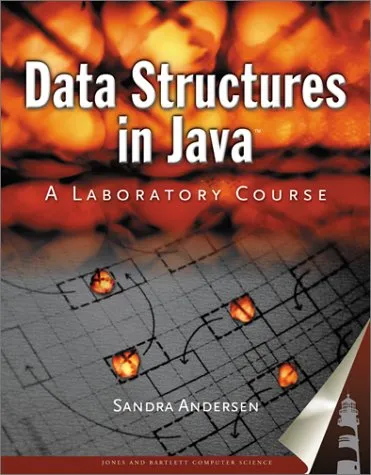Data Structures: Abstraction and Design Using Java
4.3
بر اساس نظر کاربران

شما میتونید سوالاتتون در باره کتاب رو از هوش مصنوعیش بعد از ورود بپرسید
هر دانلود یا پرسش از هوش مصنوعی 2 امتیاز لازم دارد، برای بدست آوردن امتیاز رایگان، به صفحه ی راهنمای امتیازات سر بزنید و یک سری کار ارزشمند انجام بدینکتاب های مرتبط:
معرفی کتاب ساختار دادهها: انتزاع و طراحی با استفاده از Java
کتاب Data Structures: Abstraction and Design Using Java یکی از منابع معتبر و جامع برای یادگیری مفاهیم پیشرفته ساختار دادهها، طراحی الگوریتمها و برنامهنویسی با زبان Java است. این کتاب توسط Elliot B. Koffman و Paul A. T. Wolfgang نگارش شده و بهخوبی به مفاهیمی همچون مهندسی نرمافزار، استفاده از abstraction در طراحی، و تحلیل کارایی الگوریتمها میپردازد.
اگر شما دانشجویی هستید که در درسهای مرتبط با علوم کامپیوتر مطالعه میکنید یا فردی حرفهای که به دنبال ارتقای دانش خود در حوزه برنامهنویسی و طراحی سیستمهای نرمافزاری است، این کتاب میتواند راهنمایی ارزشمند برای شما باشد.
خلاصهای کامل از کتاب
کتاب "ساختار دادهها: انتزاع و طراحی با استفاده از Java" به سه بخش اساسی تقسیم شده است. در بخش اول، مفاهیم اولیهای مانند abstraction، اصول پایهای Object-Oriented Programming و استفاده صحیح از کتابخانه استاندارد Java ارائه شده است. این بخش بهخصوص برای تازهکارها بسیار ضروری است زیرا پایههای طراحی شفاف و موثر را فراهم میآورد.
در بخش دوم، ساختارهای دادهای کلاسیکی مانند Arrays، Linked Lists، Stacks، Queues، و Trees با مثالهای واقعی بررسی میشوند. نویسندگان تأکید ویژهای بر کاربردهای عملی این ساختارها در حل مسائل دنیای واقعی دارند.
در بخش سوم، مباحث پیشرفتهای شامل Graph، Hash Tables، و تحلیل الگوریتمها معرفی میشوند. علاوه بر این، مفاهیمی مانند طراحی سیستمهای نرمافزاری کارا و پایدار نیز توضیح داده شده است.
نکات کلیدی کتاب
- تمرکز بر abstraction و اهمیت آن در طراحی نرمافزار.
- استفاده از مفاهیم پیشرفته Object-Oriented Programming برای حل مسائل پیچیده.
- بررسی Time Complexity و تحلیل کارایی الگوریتمها با استفاده از نماد Big-O.
- آموزش طراحی و پیادهسازی ساختارهای دادهای قابل بازیافت و reusable.
- ترکیب تئوری و کاربردهای عملی با استفاده از زبان Java.
نقل قولهای برجسته از کتاب
"Abstraction is not only a key to understanding complex problems, but also the foundation for better software design."
"The right data structure enables you to think clearly and solve problems elegantly."
چرا این کتاب مهم است؟
دلیل ارزشمند بودن این کتاب در این است که نهتنها به خواننده کمک میکند تا ساختارهای داده و الگوریتمها را فرا بگیرد، بلکه مهارتهای تحلیلی و طراحی نرمافزار را نیز تقویت میکند. نویسندگان با استفاده از رویکردهای مدرن و مثالهای عملی، راهکاری برای یادگیری موثر مهندسی نرمافزار ارائه میدهند. با تمرکز بر abstraction و نحوه استفاده از آن در حل مسائل پیچیده، این کتاب به یکی از منابع برتر در این زمینه تبدیل شده است.
علاوه بر این، تجربه عملی یادگیری با برنامههای کدنویسی Java و پروژههای نهایی، به خواننده این امکان را میدهد تا دانش خود را در جایگاههای واقعی استفاده کند.
در نهایت، این کتاب برای دانشجویان، مهندسان نرمافزار، و علاقهمندان به علوم کامپیوتر یک انتخاب مناسب و باارزش است که میتواند ابزاری برای یادگیری عمیقتر و مؤثرتر باشد.
Introduction to "Data Structures: Abstraction and Design Using Java"
"Data Structures: Abstraction and Design Using Java" by Elliot B. Koffman and Paul A. T. Wolfgang is a comprehensive textbook that bridges the gap between theoretical principles and practical programming skills. Published with a strong focus on modern Java practices, this book is designed to help students, programmers, and professionals master the foundational concepts of data structures while emphasizing software design, problem-solving, and algorithm development. Through detailed explanations and hands-on examples, this text enables its readers to apply structured problem-solving techniques in both academic and real-world scenarios.
Detailed Summary of the Book
At its core, this book introduces readers to essential data structures while providing in-depth insight into object-oriented programming concepts using Java. The authors use an incremental approach to teaching, ensuring that learners new to the topic can build their understanding over time. Key chapters cover abstract data types, recursion, lists, stacks, queues, trees, hashing, and graphs. Each concept is intertwined with software design methodologies, reinforcing the importance of abstraction in problem-solving and emphasizing the separation of design from implementation.
The book stands out by balancing mathematical rigor with the practicality of algorithm design, analysis, and programming. Throughout the text, readers are exposed to critical aspects of computer science, such as algorithm efficiency, time-space trade-offs, and defensive programming practices. By integrating Java's standard library with custom implementations, the book equips learners with the dual ability to use pre-existing tools and craft custom solutions tailored to unique problems.
Real-world examples and case studies bring the material to life, illustrating where and how these data structures and algorithms are employed in day-to-day software development. Every chapter concludes with well-crafted exercises designed to test comprehension, encourage creativity, and foster skill in both analysis and application.
Key Takeaways
- The text offers a strong foundation in Java programming while introducing critical data structures like linked lists, arrays, stacks, heaps, and hash tables.
- The book emphasizes principles of software engineering and abstraction, helping readers develop reusable, maintainable code.
- Readers learn how to analyze algorithms for time and space complexity, an essential skill for writing efficient and scalable programs.
- Special focus is placed on problem-solving strategies, guiding learners through the thought processes required to tackle complex computing challenges.
- Extensive examples and exercises strengthen understanding and provide opportunities to apply concepts in practical ways.
Famous Quotes from the Book
"Abstraction is the key to managing complexity in software design and development."
"Good software design involves not only solving the problem but also solving it efficiently and elegantly."
"Problem-solving is a skill that improves with practice, and mastering algorithms and data structures is pivotal to this improvement."
Why This Book Matters
This textbook is more than just another guide to data structures and algorithms; it is a tool for preparing the next generation of software engineers and computer scientists. The careful integration of theoretical foundations with practical programming examples ensures that readers not only understand concepts but are also equipped to apply them effectively in a variety of settings. Featuring cutting-edge Java patterns and tools, the book helps readers stay relevant in a rapidly evolving tech landscape.
Whether you are a student pursuing computer science, a self-taught programmer learning to enhance your skills, or a professional seeking deeper insights into data structures, this book provides the clarity, depth, and practical guidance needed for success. Its emphasis on abstraction and systematic problem-solving fills a critical gap between basic programming and advanced software design, making it an invaluable resource in any library.
دانلود رایگان مستقیم
شما میتونید سوالاتتون در باره کتاب رو از هوش مصنوعیش بعد از ورود بپرسید
دسترسی به کتابها از طریق پلتفرمهای قانونی و کتابخانههای عمومی نه تنها از حقوق نویسندگان و ناشران حمایت میکند، بلکه به پایداری فرهنگ کتابخوانی نیز کمک میرساند. پیش از دانلود، لحظهای به بررسی این گزینهها فکر کنید.
این کتاب رو در پلتفرم های دیگه ببینید
WorldCat به شما کمک میکنه تا کتاب ها رو در کتابخانه های سراسر دنیا پیدا کنید
امتیازها، نظرات تخصصی و صحبت ها درباره کتاب را در Goodreads ببینید
کتابهای کمیاب یا دست دوم را در AbeBooks پیدا کنید و بخرید
1352
بازدید4.3
امتیاز0
نظر98%
رضایتنظرات:
4.3
بر اساس 0 نظر کاربران
Questions & Answers
Ask questions about this book or help others by answering
No questions yet. Be the first to ask!
